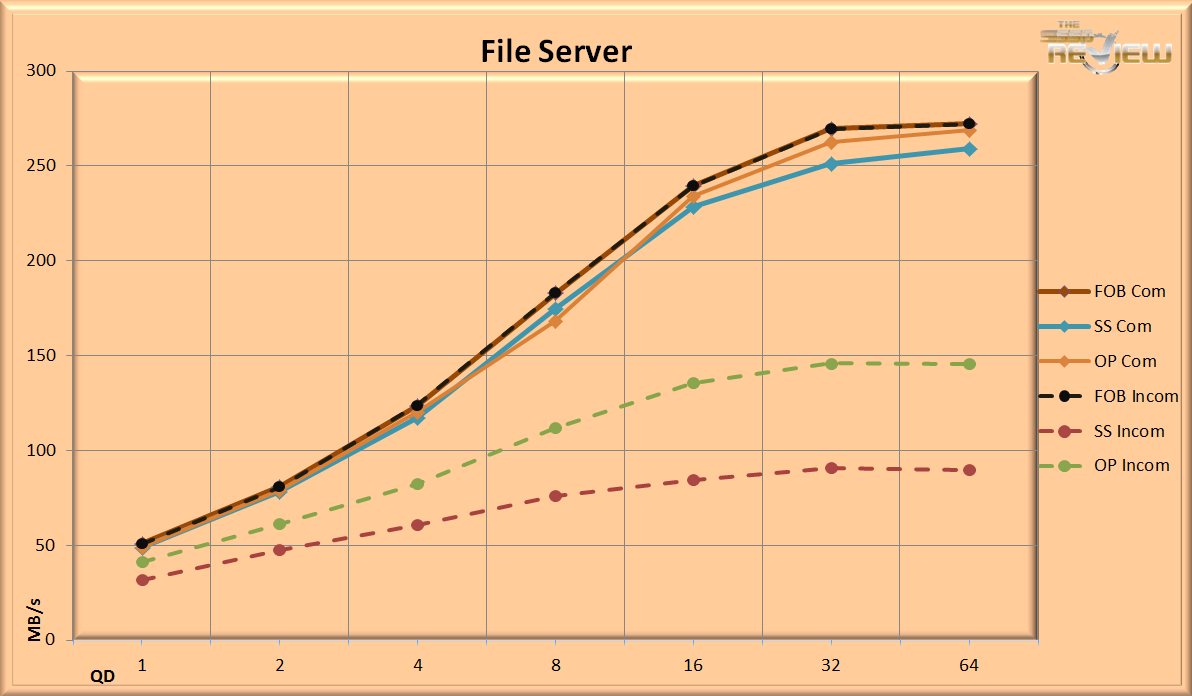SERVER PROFILES
The File Server profile emulates usage in a file server environment with a vast range of file sizes being accessed simultaneously. This type of file access is 80% read and 20% write. The performance does vary from Steady State and Overprovisioned, showing that with the proper tuning these drives can be optimized for their environment. Depending upon the type of files that are being hosted, for compressible data it will perform at much higher levels. Even with the incompressible data these SSDs are still exponentially faster than HDDs.
 The Email profile is an emulation of a mail server, with a 50% Read and 50% Write mixed workload with very small 8KB files. This can be a very stressful test for even the best of drives. These workloads tend to fall into more of the incompressible data pattern. For these types of heavily write intensive random workloads the eMLC will benefit customers greatly with its greater endurance.
The Email profile is an emulation of a mail server, with a 50% Read and 50% Write mixed workload with very small 8KB files. This can be a very stressful test for even the best of drives. These workloads tend to fall into more of the incompressible data pattern. For these types of heavily write intensive random workloads the eMLC will benefit customers greatly with its greater endurance.
 The Database/OLTP (On-Line Transaction Processing) profile is another heavy-usage type of access that can bring many drives, even those with superior write performance, to their knees given Steady State conditions. With small 8K random data being read at 66% and written simultaneously at 33%, the XceedIOPS2 dominates, peaking at nearly 350MB/s in Steady State conditions. The only erratic reading that we encountered in our testing came here, with the overprovisioned results actually coming in lower than the Steady State results.
The Database/OLTP (On-Line Transaction Processing) profile is another heavy-usage type of access that can bring many drives, even those with superior write performance, to their knees given Steady State conditions. With small 8K random data being read at 66% and written simultaneously at 33%, the XceedIOPS2 dominates, peaking at nearly 350MB/s in Steady State conditions. The only erratic reading that we encountered in our testing came here, with the overprovisioned results actually coming in lower than the Steady State results.
Databases tend to be extremely compressible, so in real deployments look for the performance to be along the upper lines.
 The Web Server profile is read only over a wide range of file sizes, with pure random data. As we can see there is very little variability for any drive state, or when using compressible and incompressible data. As a whole, the compressibility of data does not affect the read speed, so this performance is very good.
The Web Server profile is read only over a wide range of file sizes, with pure random data. As we can see there is very little variability for any drive state, or when using compressible and incompressible data. As a whole, the compressibility of data does not affect the read speed, so this performance is very good.
 The IOPS per Watt measurements below take the performance of the SSD at QD32 compared to the amount of wattage that we recorded being consumed. The XceedIOPS2 scores very well in IOPS/Watts, with 10,566 for the 4K read IOPS when measured with compressible data. Bear in mind that read speeds do not vary by wide margins with incompressible data. With the 4k Write IOPS we do see more variability between the IOPS/Watts numbers. Factoring in the compression, the results are very good, especially for the price range of these SSDs.
The IOPS per Watt measurements below take the performance of the SSD at QD32 compared to the amount of wattage that we recorded being consumed. The XceedIOPS2 scores very well in IOPS/Watts, with 10,566 for the 4K read IOPS when measured with compressible data. Bear in mind that read speeds do not vary by wide margins with incompressible data. With the 4k Write IOPS we do see more variability between the IOPS/Watts numbers. Factoring in the compression, the results are very good, especially for the price range of these SSDs.
 The SSD Review The Worlds Dedicated SSD Education and Review Resource |
The SSD Review The Worlds Dedicated SSD Education and Review Resource | 
Awesome product!
The independent review on you-tube, shows Enterprise/Server level at 50,000 to 100,000 P/E not 10,000 like this review states?
This report dates back to 2012. SMART is no longer a company. The reviewer, Paul Alcorn, was and remains to be one of the best storage evaluators in the industry.